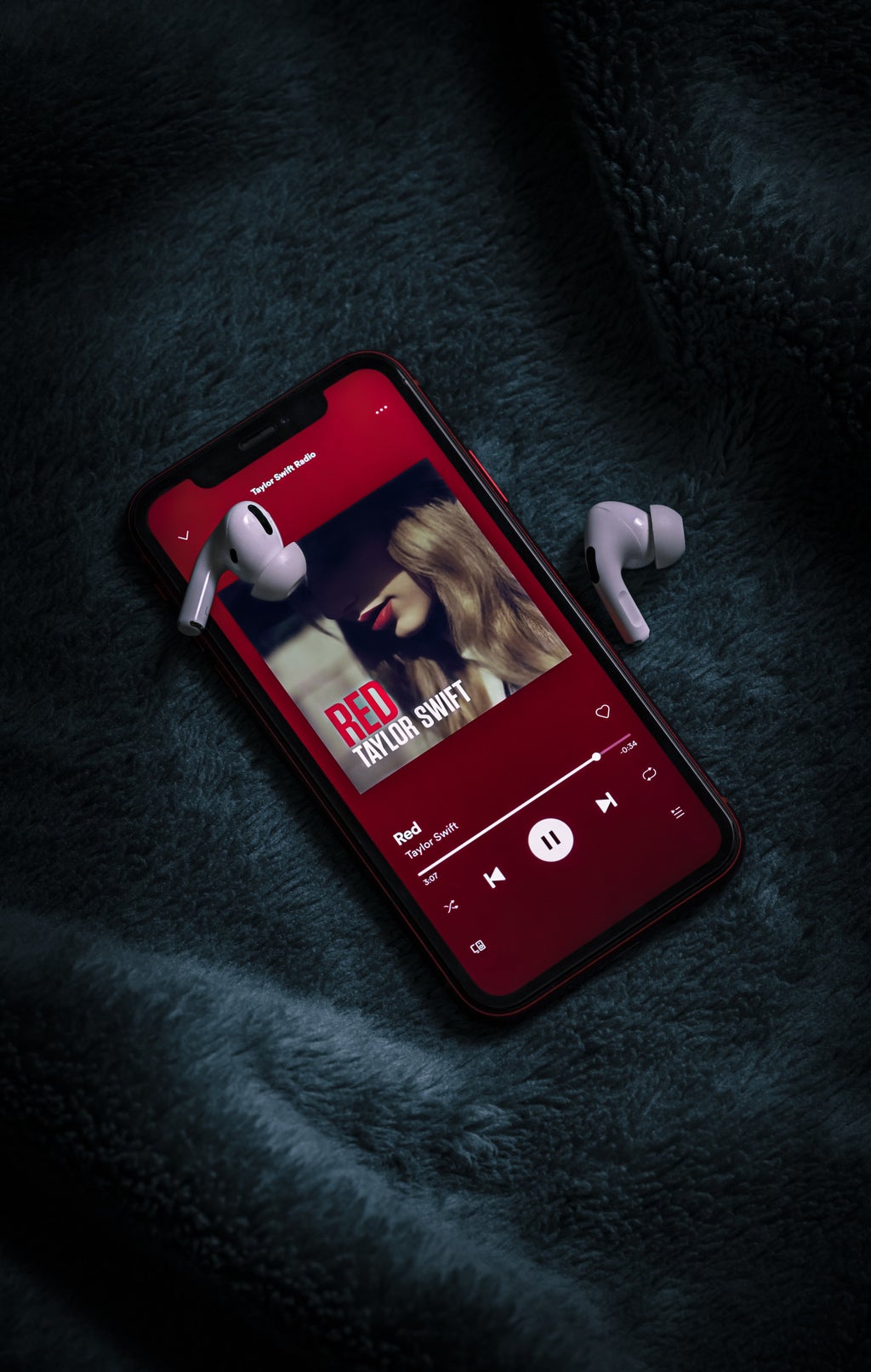There is nothing like listening to a good old nostalgic sad song on a chilly walk home from campus. It must be the wind in my hair and autumn leaves falling down like pieces into place that never fails to put me in an emotionally vulnerable state of mind… like ever. And luckily, the queen of “sad girl autumn” has come to the rescue once again! Red (Taylor’s Version) was released on Friday, November 12 and its timing could not be more perfect. For one, I am actually turning 22 next year and *not* in elementary school pretending my life was a Taylor Swift music video. In other words, this record now resonates with me on a much deeper level than it did a decade ago. The past few years for me have felt like a whirlwind of events and emotions, but if there is any constant in my life amid all the chaos, it’s Taylor’s music. It’s accompanied me through everything, from morning commutes, to late-night cram sessions, to sleepless nights wondering what is to come from the delicate beginning rush of a relationship, until they vanish into nothing but flashbacks and echoes. While listening to Red (TV) and reminiscing over forgotten memories, I took it upon myself to write about how my interpretation of Red song lyrics in this re-recording has transformed over the years, as though I were seeing them with brand new eyes.
As for Taylor herself, this album serves as a true breakup record. And I’m just not talking about how the songs cover all the different stages of grief. This album is part of her major re-recording project following her public divorce from Big Machine Records, her former record label, whose CEO, Scott Borchetta, sold her master recordings to Scooter Braun (Ithaca Holdings LLC) without her permission and further denied her the rights to purchase them herself. More about that *here.* However, in true Taylor Swift fashion, she has been anything but passive in this dispute. After endless attempts at resolution, she took matters into her own hands and announced in August 2019 that she would be re-recording her first six albums to reclaim the rights to her masters. Since then, she has released three studio albums, Lover, Folklore and Evermore, in addition to Fearless (Taylor’s Version), her first of five re-recordings. Not to mention, Red marked Taylor’s divergence from country and consequent transition to pop, which received a lot of backlash from music critics at the time. Nevertheless, we now know that this transition was just the beginning of her continuous evolution as an artist.
Red (Taylor’s Version) boasts thirty tracks, six of which are “from the vault,” a name she has penned for her extensive collection of never-before-heard songs from the respective era. This includes collaborations with Phoebe Bridgers in “Nothing New,” Ed Sheeran in “Run” (on top of “Everything Has Changed” 2.0!) and Chris Stapleton in “I Bet You Think About Me.” A self-proclaimed oasis for the brokenhearted, Red is known to have a special place for Swifties. Namely, “All Too Well” quickly became a fan-favourite for its vivid lyricism and powerful country-rock influence. Although it was never made an official single, it may as well have been one. But more on that later. While I could talk about this lyrical masterpiece all day (and I mean it, this woman hides easter eggs to no end), I’m going to fixate on the tracks that, to my mind, define the entirety of the album.

First and foremost, the first vault track of the album, “Nothing New” (ft. Phoebe Bridgers), was one that really touched a chord with me. It speaks on the all-too-familiar feeling of feeling lost and lacklustre while living in what is supposed to be an exciting time, a “golden age.” Taylor sings, “How can a person know everything at eighteen / But nothing at twenty-two? / And will you still want me when I’m nothing new?” In your 20s, society expects you to have it all figured out and to have grown a backbone, when in reality, it’s not always that easy. In the second verse, Phoebe sings, “How long will it be cute, all this crying in my room? / When you can’t blame it on my youth.” This line refers to the fear of growing up and losing one’s youth to depression and anxiety, wondering where it all went wrong.
Meanwhile, “22” serves as a sort of intermission from feelings of hurt and heartbreak and instead, transports you to a night full of dancing, a sweet escape from responsibility. “22” celebrates being in your turbulent 20s and embraces the miserable and magical time of aimless wandering and feeling everything all at once. I have to say, my pre-teen self would never have thought that the school dance hit of 2012 would bring so much sentimental value to me as a young adult.
Now, let’s talk about “All Too Well.” I think I am speaking for many Swifties when I say that no other song comes even close to evoking such pleasurable sadness… other than its 10-minute version plus a short film, of course. It paints a crystal clear picture of a destructive relationship and is said to be about actor Jake Gylenhaal, nine years Taylor’s senior. In the song, the infamous scarf symbolizes a piece of yourself you’ve left in someone else’s possession, and the grueling process of trying to get it back, as she sings in the last pre-chorus: “Time won’t fly, it’s like I’m paralyzed by it / I’d like to be my old self again / But I’m still trying to find it.” The extended version features two additional verses in which she expresses how her ex-lover’s casually cruel nature consumed her whole. She also makes direct reference to the considerable age gap between them and how it was wrongfully used to justify the collapse of the relationship. She then holds her subject accountable for continuing to chase after younger women in the fourth verse: “And I was never good at telling jokes, but the punch line goes / I’ll get older, but your lovers stay my age.” With a direct link to “The Moment I Knew,” Taylor alludes to the infamous birthday party which this “actor” did not attend, thus causing her to spend her 21st birthday crying in her new dress, waiting for him to turn up. This difference in age is also strongly implied in “Forever Winter,” in which she touches on her sheer naïveté in saying “too young to know it gets better.” On the bright side, however, this moment would lead to the end of the love affair, which would then segue into the empowering anthem, “We Are Never Ever Getting Back Together.” Haunted by memories past, Taylor pleads with her ex to admit that the breakdown of their relationship damaged him as it did her when she sings, “just between us, did the love affair maim you, too?” In addition to this, Taylor also directed and starred in its short film starring Stranger Things’s Sadie Sink and Dylan O’Brien. Opened with a Neruda quote (“Love is so short; forgetting is so long”), the short film is divided into the phases of the romance, from the precious moments that feel surreal, to “the first crack in the glass,” to the eventual breakup and tragic aftermath. At the end of the video, Swift plays the present-day version of Her, at her book signing, before the camera turns to her former lover, outside looking through the storefront window. And guess what? He is wearing the scarf.
Personally, I think of “State of Grace” (Acoustic Version) as the album’s opening, and its pop version as a culmination of the entire record. The stripped-down, lullaby-esque version is sung with a hint of melancholy and expresses a time of glorious uncertainty in the beginning stages of a relationship. In a Spotify commentary, Taylor indicates that the line “love is a ruthless game / unless you play it good and right” defines the album as a collective and serves as a warning for the euphoric state, or the destruction that can come out of a romance. On the other hand, something about the drum loops and the electric guitar riffs in the pop version evokes optimism. If interpreted as a hopeful tune, “State of Grace” is about letting life take its own course, accepting and embracing the triumphs and downfalls that come with it, because happiness is a worthwhile fight. It reminds me of a piece of advice Taylor gave to a fan via Instagram back in 2014, which has stuck with me after all this time. In the comment, she asserts that the validity of love shouldn’t be determined by its temporal course or its reciprocity; with this in mind, she tells her:
“You are loving someone purely because you love them, not because you think you’ll ever have your affections reciprocated. You are admiring something for its beauty, without needing to own it. Feel good about being the kind of person who loves selflessly. I think someday you’ll find someone who loves you in that exact same way.”
While not an easy feat, these are definitely words we should all try to live by.
Long story short, Red (Taylor’s Version) is a mélange parfait of songs to cry to, to have on while having breakfast at midnight, or to dance to with your girlfriends in the refrigerator light. Whether you feel happy, free, confused, lonely, or all of the above, I think this album has something for you—go give it a listen!



